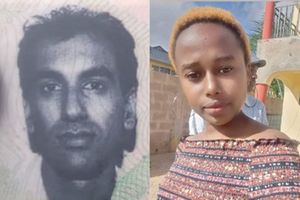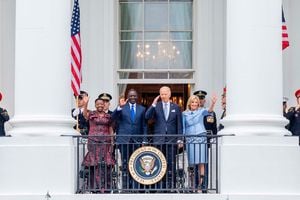‘Makossa’ legend Sam Fan Thomas thrills Kenyan fans

Sam Fan is now considered one of the greatest guitarists in Africa. PHOTO| FILE| NATION MEDIA GROUP
What you need to know:
- Sam Fan’s music mainly revolves around issues in the society and lifestyle, to which we can all relate. One such song is "Noa".
- I never could get its lyrics right at first. In the song he talks about someone who has a problem that keeps multiplying every time he tries to solve it.
Africa’s first encounter with Europe was meant to be a different but equal partnership. That never came to be as it rapidly degenerated into a one-sided association, first through slave trade and then colonisation.
Soon, many Africans had had enough and freedom movements came up, manifested in political movements, armed resistance, even art and music.
In South Africa, many musicians were sent into exile for singing against the Apartheid regime. They include Miriam Makeba and Hugh Masekela. In West Africa, Fela Kuti kept up the fight even after independence.
At the height of the anti-Apartheid movement, with Nelson Mandela still in prison, a young musician from Cameroon decided to compose a song in honour of Mandela.
The song Mandela was released in 1988 by Sam Fan Thomas, two years before Mandela was released from prison. At the time, the makossa genre was very popular.
“I wanted to pay homage to Mandela, so I wrote a song that could be played in clubs. I wanted people to dance but still remember what was happening in Africa,” says Sam Fan Thomas.
He was in Kenya last week and granted Saturday Nation an interview.
Mandela was one of the many hits Sam Fan produced over the years. His musical career started off with the Tigres Noires band from 1968 until 1976 when he left for a solo career. He was a guitarist who moved on to singing.
He explained why it was important for him to start off as a guitarist. “You cannot be a true musician without first learning to play an instrument. Once I had fully mastered the makossa beat, I went solo.”
Sam Fan is now considered one of the greatest guitarists in Africa.
WE CRY USING MUSIC
Fela Kuti once said: “When we cry in Africa, we cry using music.” Yet when we are happy, we show it through music as well.
Sam Fan’s music mainly revolves around issues in the society and lifestyle, to which we can all relate. One such song is "Noa". I never could get its lyrics right at first. In the song he talks about someone who has a problem that keeps multiplying every time he tries to solve it.
Another of his famous compositions is "African Typic Connection". Many Kenyans struggled to get its French lyrics right. It is a song that invites Africans to accept African music and unite for a good course.
For those who may not know, Sam Fan did borrow the verse, “mosala na kosalaka amama, aaah” from the king of Congolese rumba Franco’s tune Boma L’heure.
“Franco is a legend, you cannot think and talk about African music without mentioning him because he is a point of reference for all artists. It is hard to believe he never went far with formal school,” says the musician who was the star guest at this year’s Koroga Festival in Nairobi last weekend.
Rumba music existed before makossa music. In fact, according to Sam Fan, the makossa beat came about after independence. Sam Fan recorded most of his music in Europe, where he found better studios and better producers.
Sam Fan attributes his success to his mother, who encouraged him to exploit his talent. He also has a great team, including his current manager Jeff Jay, a former music producer and publisher from France, who has worked with artists like Magic System, Mokobe and Passi.
“I have worked with Sam Fan for five years now, and together we have managed to bring a new energy to his career. His new song Che Gwon Laa, which will soon be on iTunes, Bealive and Deezer, is evidence of how we have been able to integrate the new generation into his music.”
When asked about African artists that he emulated while growing up, Sam Fan mentions countryman Manu Dibango, DRC’s Tabu Ley and Franco, plus other musical predecessors from Cameroon. According to him, these three are a point of reference in African music.
MENTORED SEVERAL ARTISTES
Despite his busy schedule over the years, Sam Fan has managed to mentor several Cameroonian artistes. They include Lady Ponce and Tonto Ebogo.
“God has helped me, he gave me talent so it is important for me to pass it on to others,” he says.
He actually looks younger than his age for a man who was born in 1952.
So what is his secret for staying young? “I don’t do anything special. I play football every day, play my music and I eat what I know; that’s basically the food that my mother gave me when I was a child,” he says.
Sam Fan is a proud father to four daughters and a son, all who are currently schooling in France.
His trip to Kenya for the Koroga Festival last weekend was his first to the country since 1992.




